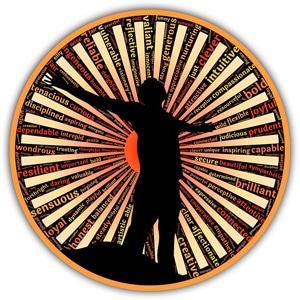
September 23, 2019
You’ve Got The Power
By Michael D. Shaw
Regarding health care in general, and your own situation in particular, the Internet has given everyone access to virtually unlimited information on health. Of course, not all the information is correct, and some may even be dangerous. Nonetheless, there are worse problems than having too much possibly relevant data available.
Even in 2019, elements of the information mandarin class still seem to exist. In the early days of online sources, conventional media outlets often condemned these upstarts as being sensationalistic. Now, and quite ironically, the mainstream media has embraced “click-bait” articles as the way to survive—all the while hawking them on their own websites. However, transforming themselves into what they claim to despise has not helped their reputation, with confidence in the press posting embarrassingly low numbers.
As to health information, thousands of such websites exist, with cautions raised on being careful of the sources you find. After all, why should you trust some Internet guy when you could instead go to a prestige medical journal such as The Lancet? Had you been reading that journal in 1998, you would have come across a study claiming that measles-mumps-rubella vaccine caused autism in 12 children.
Yes, that study appeared in this august peer-reviewed publication, only to be massively criticized for a host of reasons. Yet, it was not retracted until 2010. Moreover, Brian Deer, the man principally responsible for exposing the fraud involved, claimed that the medical establishment still seemed to defend Andrew Wakefield, who wrote The Lancet paper.
I personally encountered some science fanboys—in high places—who felt that the scandal heaped on the science establishment in this connection was undeserved. A strange attitude indeed toward an article that almost single-handedly lowered vaccination rates in the US and the UK, among other countries.
Suffice to say that boatloads of garbage have been published under peer review, and caveat emptor must apply to “prestige” and non-prestige sources alike. Thus, you certainly have the power to get unlimited health information online, but you should consult numerous sources and exercise plenty of discretion and common sense in this pursuit.
Some years ago, this column covered the subject of Mobile Health aka mHealth. “Mobile Health” can be broadly defined as the use of mobile phones and other wireless technology in medical care. The linked reference goes on to note that “The most common application of mHealth is the use of mobile devices to educate consumers about preventive healthcare services. However, mHealth is also used for disease surveillance, treatment support, epidemic outbreak tracking and chronic disease management.”
An added benefit is that various medical devices can be connected to your smartphone, including an EKG monitor; fitness trackers; sphygmomanometers; a blood alcohol measuring unit; and a blood glucose meter.
A wide assortment of reference sources is also available for your device, including Stedman’s Medical Dictionary, Epocrates, and the CDC Mobile App.
But, as users of mobile devices know only too well, power is always a factor. In certain cases, such as battery-draining navigation apps, many users simply plug their phone into their car charger. In other circumstances, you might find a convenient wall outlet or a purpose-designed charger. But those airport charging stations can also harbor significant security risks.
A big help to those on-the-go—especially when you are far from civilization—are portable power banks. Such units come with a variety of features, and if you need the ability to charge multiple devices multiple times, be prepared for the size and price to increase.
I was recently introduced to a brand-new feature-rich product in this space called SOUL Power. Features include:
- 44,300 mAh Capacity
- USB Connections
- 120W Pure Sine Wave AC Outlet
- Wireless charging pad
- Connection to jump-start your car
- Can be recharged with any conventional means, and via solar
CEO Mark Cunningham told me…
“SOUL Power leads the charge among hikers, runners, and outdoor enthusiasts in general. By charging the devices that people use to track their health and record their progress, by ensuring that these devices have more than enough power to memorialize the moment—from snapping photos from the highest mountain to curating videos of new heights in personal fitness—SOUL Power is at the ready. We keep your devices running, so you can stay active and be on the go.”
